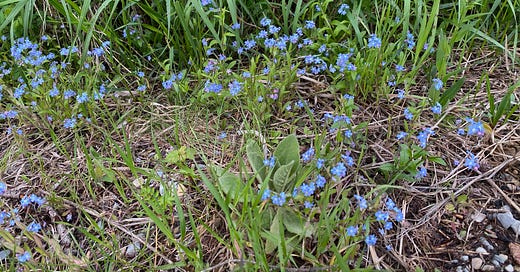“When bird does wait thy absence long,
Nor tend unto its morning song;
While thou art searching stoic page,
Or listening to an ancient sage,
Whose spirit curbs a mournful rage,
Forget me not.”
—from “Forget Me Not,” Ann Plato
I have to confess, I’ve never actually enjoyed gardening that much. I’m more of a hunter-gatherer than an agriculturalist. I’d prefer to both hunt and gather than to tend. But once I started to think about it not as gardening/growing things but as caring for and restoring the soil—an in between place of husbandry—it magically became something I craved. Ever since my own kids became toddlers, I’ve seen children’s tendency to collect sticks and rocks as answering a craving for groundedness, a craving we maybe learn to suppress or to answer with other, less fulfilling, things as we grow. Listening to that interview a couple of weeks ago about soil redirected my focus in profound ways that I hope will last (though I purchased and read the interviewee’s book, and it ended up being all about the divine feminine, etc., not about soil at all really, which was disappointing but made me think I should finally get around to reading Kristin Ohlson’s The Soil Will Save Us).
The thistles and knapweed continue to be overwhelming. It’s a relief to walk around town and find forget-me-nots and wild phlox in shady places making friends with aspen trees. But even with the thistles and knapweed, at least I’ve got my hands and feet in the dirt.
—-
In this week’s newsletter from Create Real Democracy, an historical note I hadn’t heard before on the ongoing difficulty with the corporations-are-people argument:
“1949 – Justice William O. Douglas dissents in Wheeling Steel Corp. v. Glander [337 U.S. 562] Supreme Court decision – states that corporations are not persons
Regarding the ruling that corporations are given rights as persons under the 14th Amendment, Douglas stated, ‘I can only conclude that the Santa Clara case was wrong and should be overruled . . . There was no history, logic or reason given to support that view nor was the result so obvious that exposition was unnecessary . . . If they [the people] want corporations to be treated as humans are treated, if they want to grant corporations this large degree of emancipation from state regulation, they should say so. The Constitution provides a method by which they may do so. We should not do it for them through the guise of interpretation.’”
“Santa Clara” being the infamous 1886 U.S. Supreme Court case Santa Clara County v. Southern Pacific Railroad Company that granted corporations rights of personhood under the 14th amendment to the U.S. Constitution. Except it didn’t, quite. The personhood argument was a headnote added by a Reporter of Decisions (who happened to have formerly been the president of a railway company), and was then approved by the Chief Justice. It was never actually part of the justices’ opinion, either majority or dissenting, and yet its effects last to this day.
—-
Fertile soil is both a metaphor and a real-life dire need. Our soil is depleted and exhausted, but so are our imaginations. We’ve strip-mined everything, including ourselves.
—-
Some stuff to read or listen to:
When we’re looking for extraterrestrial life, what do we mean by “life”? In Sapiens, Gideon Lasco writes that for anthropologists, the assumptions have changed drastically. “The discovery of possible evidence of alien microbes on Venus may constitute a “minimalist” version of people’s expectations of extraterrestrial life—but it is still relaunching age-old discussions about humanity’s place in the world, and our world’s place in the universe.”
New York Times columnist Jamelle Bouie talking up e-bikes and the essential work of civic engagement on the War on Cars podcast. “We’re experiencing this right now. A big, massive relief bill was passed by the Biden Administration and Democrats in Congress, and the Republicans in Congress are going on about Dr. Suess or whatever. I think the right response is just not even to engage it. . . . I don’t know how much that’s going to work, but I do know that endlessly trying to litigate culture war stuff from the perspective of governance is a fool’s errand.”
I forgot to link to this last time around: Kate Raworth’s excellent interview about her Doughnut Economics Lab on the Frontiers of Commoning podcast. I might have quietly become a fangirl solely for her focus on just getting shit done: “It’s all about action. . . . I really sincerely believe that 21st-century economics is being practiced first; it will be theorized later.”
Pondercast on all the noise of gathering and togetherness that’s been missing over the last year.
If you liked The Overstory, you might enjoy this interview with forest ecologist Suzanne Simard about her life’s work and her new book Finding the Mother Tree: Discovering the Wisdom of the Forest.





Nia, that last paragraph! Holy cow. Thank you.
Nia, that last paragraph! Holy cow. Thank you.